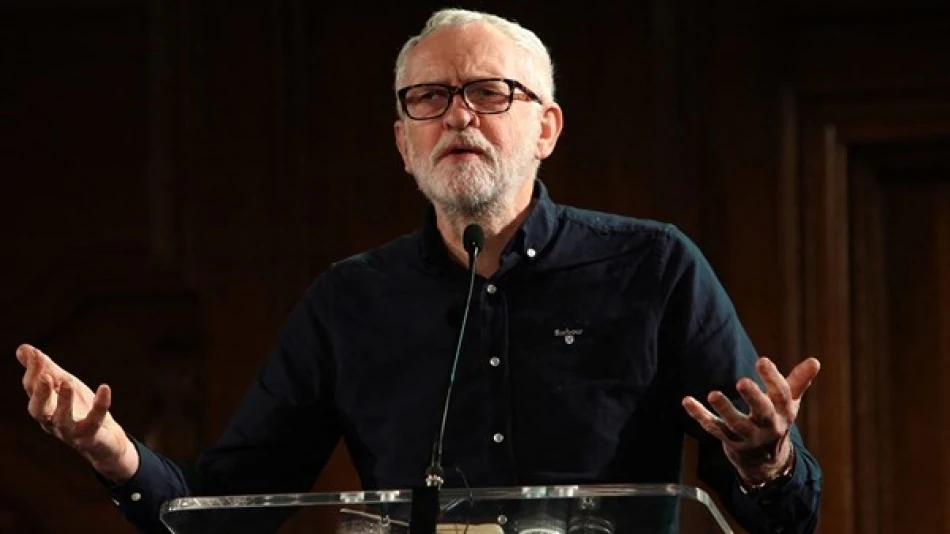
Former UK Labour Leader Launches New Political Party to Challenge Establishment
Jeremy Corbyn Launches New Left-Wing Party to Challenge Labour's Pro-Palestine Stance
Former Labour leader Jeremy Corbyn has announced the formation of a new political party called "Your Party," marking a significant fracture on Britain's left as he seeks to capitalize on growing dissatisfaction with Keir Starmer's centrist approach. The move, made alongside independent MP Zara Sultana, positions the new party as a vehicle for more radical left-wing politics and unwavering support for Palestinian independence.
A Direct Challenge to Starmer's Labour
The 76-year-old Corbyn's decision to formalize his break from Labour represents more than personal grievance—it signals a strategic attempt to reclaim the progressive ground he believes Starmer has abandoned. In their joint statement, Corbyn and Sultana emphasized their commitment to a "free and independent Palestine," directly challenging Labour's more cautious approach to Middle Eastern policy at a time when Starmer faces mounting internal pressure to recognize Palestinian statehood.
This timing is particularly shrewd. With Labour now in government but facing criticism from its left flank over various policy positions, Corbyn is positioning himself as the authentic voice of progressive politics that Labour once represented under his leadership.
The Political Arithmetic Behind the Split
Corbyn's electoral mathematics may be more promising than his critics suggest. Despite losing two general elections as Labour leader in 2017 and 2019, he demonstrated remarkable personal resilience in July 2024, easily retaining his North London constituency of Islington North as an independent candidate after Labour refused to endorse him.
This victory—achieved despite being expelled from the party he led for four years—proves Corbyn retains significant grassroots appeal. His 40-year tenure representing the constituency provides a solid foundation for building a broader movement that could attract disaffected Labour voters, particularly in urban areas with large Muslim populations concerned about Palestine.
The Antisemitism Shadow Still Looms
However, Corbyn's new venture cannot escape the controversies that defined his Labour leadership's final years. His 2020 suspension from Labour followed his refusal to fully accept findings from the Equality and Human Rights Commission regarding antisemitism within the party during his tenure. Corbyn's continued insistence that the issue was "dramatically overstated for political reasons" suggests he remains unrepentant about this chapter.
This stance will likely limit the new party's broader appeal while potentially energizing its core supporters who view the antisemitism allegations as politically motivated attacks designed to undermine Corbyn's pro-Palestinian advocacy.
Market for a New Left-Wing Party
The British political landscape has shown increasing fragmentation in recent years, from UKIP's rise and fall to the brief surge of Change UK. However, Corbyn's venture differs significantly—he brings established name recognition, a proven ability to mobilize grassroots activists, and clear ideological positioning that fills a perceived gap in current politics.
The party's emphasis on being "rooted in our communities, trade unions, and social movements" suggests a bottom-up organizing strategy that could prove more durable than previous centrist breakaway attempts. With Labour now governing from the center, there's potentially fertile ground for a party that promises more radical solutions to economic inequality and takes stronger stances on international issues.
Implications for British Politics
For Starmer's government, Corbyn's new party represents a manageable but persistent irritant. While unlikely to win significant parliamentary representation under Britain's first-past-the-post system, it could complicate Labour's position in certain constituencies and force the party to defend its left flank more actively.
The real test will be whether "Your Party" can build beyond Corbyn's personal brand and create lasting institutional structures. British politics has seen numerous personality-driven parties fade once their founding figures step back, but Corbyn's age and the involvement of younger figures like Sultana suggests succession planning may already be underway.
Most Viewed News

 Layla Al Mansoori
Layla Al Mansoori






